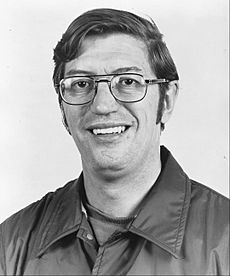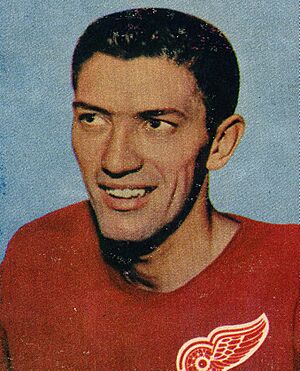Al Arbour facts for kids
Quick facts for kids Al Arbour |
|||
|---|---|---|---|
| Hockey Hall of Fame, 1996 (Builder) | |||

Arbour in 1977
|
|||
| Born | November 1, 1932 Sudbury, Ontario, Canada |
||
| Died | August 28, 2015 (aged 82) Sarasota, Florida, U.S. |
||
| Height | 6 ft 0 in (183 cm) | ||
| Weight | 180 lb (82 kg; 12 st 12 lb) | ||
| Position | Defence | ||
| Shot | Left | ||
| Played for | Detroit Red Wings Chicago Black Hawks Toronto Maple Leafs St. Louis Blues |
||
| Coached for | St. Louis Blues New York Islanders |
||
| Playing career | 1949–1971 | ||
| Coaching career | 1970–1994 | ||
Alger Joseph Arbour (November 1, 1932 – August 28, 2015) was a famous Canadian ice hockey player, coach, and leader. He is known for being one of the top coaches in National Hockey League (NHL) history. Al Arbour led the New York Islanders to win four Stanley Cups in a row, from 1980 to 1983.
Born in Sudbury, Ontario, Canada, Arbour started playing hockey as a defenceman. He played for the Windsor Spitfires before joining professional teams. His first professional games were with the Detroit Red Wings in 1953.
Contents
Al Arbour's Playing Days
Al Arbour played for several NHL teams during his career. He joined the Chicago Black Hawks in 1958 and helped them win a Stanley Cup in 1961. After that, he played for the Toronto Maple Leafs for five years. With the Maple Leafs, he won another Stanley Cup in 1962 and again in 1964.
Arbour was one of only a few players to win the Stanley Cup with three different teams. He was also the very first captain for the St. Louis Blues when they joined the league in 1967. He played his last four seasons with the Blues.
Al Arbour was unique because he wore eyeglasses while playing. He was the last NHL player ever to wear glasses on the ice during a game. He was also known for bravely blocking shots with his body.
Becoming a Coach
During his final year as a player with the St. Louis Blues, Al Arbour was asked to become the team's coach. He led them to a good record, but they only won one playoff series.
After leaving the Blues, Arbour was hired by the New York Islanders in 1973. The Islanders were a new team and had a very tough first season, winning only 12 games. Arbour was brought in to turn things around.
Leading the Islanders to Glory
In his first season with the Islanders, the team still finished last. However, they improved a lot, giving up 100 fewer goals than the year before. Other teams started to notice their progress. A rival player, Brad Park, said the Islanders "look like a hockey team" after they beat the New York Rangers for the first time.
The 1974–75 season was a big step forward. The Islanders made the playoffs for the first time! They won their first-round series against the Rangers. In the next round, they faced the Pittsburgh Penguins and fell behind 3–0 in the series. But the Islanders made an amazing comeback, winning three straight games to tie the series. They then won Game 7, becoming only the second team in major sports history to win a series after being down 3–0. They almost did it again in the next round against the Philadelphia Flyers, but lost in Game 7.
Even though they had great regular seasons, the Islanders struggled in the playoffs for a few years. They lost to the Montreal Canadiens twice and then to the Toronto Maple Leafs. In 1979, the rival Rangers beat them. Despite these playoff losses, Arbour won the Jack Adams Award in 1979 as the league's best coach for the team's excellent regular season.
The 1979–80 season started tough for the Islanders. But after they added player Butch Goring in March, the team became unstoppable. They finished the regular season with a 12-game winning streak. This momentum carried into the playoffs, and on May 24, 1980, the Islanders won their first-ever Stanley Cup by beating the Philadelphia Flyers in overtime.
Al Arbour and the Islanders then won three more Stanley Cups in a row! This was a record for an American hockey team. They also set records for winning streaks in the regular season and playoffs. By the time the Edmonton Oilers finally beat them in the 1984 Stanley Cup Finals, the Islanders had won an incredible 19 playoff series in a row. This is a professional sports record that still stands today!
After the 1985–86 season, Arbour decided to retire from coaching. He took a job in the Islanders' front office, helping to develop new players.
Coming Back to Coach
In 1988, the Islanders were not doing well. So, Al Arbour returned to coach the team again. Most of the famous players from the Stanley Cup winning teams had left. The Islanders missed the playoffs for the first time in 14 years.
However, Arbour had one more amazing playoff run in 1992–93. He led the Islanders past the Pittsburgh Penguins, who had won the Stanley Cup for the past two years. Even though the Islanders' star player, Pierre Turgeon, was injured, Arbour's team defeated the Penguins in a thrilling Game 7 overtime. The Islanders then lost to the Montreal Canadiens in the next round.
Al Arbour retired for good after the 1993–94 season. He had coached the Islanders for 739 wins. A special banner with this number was raised to the ceiling at the Nassau Veterans Memorial Coliseum to honor him.
His Final Game and Legacy
On November 3, 2007, Al Arbour returned to coach one more game for the Islanders. He was 75 years old, making him the oldest person to coach an NHL game. The Islanders won that game 3–2 against the Pittsburgh Penguins, giving Arbour his 740th win. The banner with 739 wins was replaced with a new one showing 1500, which was the total number of games he coached for the Islanders. He is the only coach in NHL history to coach 1,500 games for the same team.
Al Arbour passed away on August 28, 2015, at the age of 82. He is remembered as one of the greatest coaches in hockey history.
His amazing achievements include:
- Being a member of the Hockey Hall of Fame.
- Winning the Jack Adams Award as best coach in 1979.
- Winning the Stanley Cup as a player in 1954 (Detroit), 1961 (Chicago), 1962, and 1964 (Toronto).
- Winning the Stanley Cup as head coach for the New York Islanders from 1980 to 1983.
- Receiving the Lester Patrick Trophy for his contributions to hockey.
Images for kids
See also
 In Spanish: Al Arbour para niños
In Spanish: Al Arbour para niños
 | Anna J. Cooper |
 | Mary McLeod Bethune |
 | Lillie Mae Bradford |



